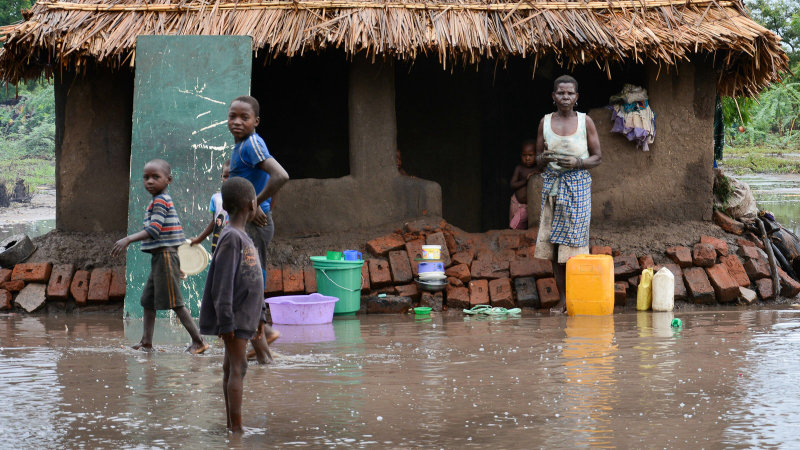.jpeg) In recent days, Malawi has been hit by a series of severe floods that inundated most areas of the Central and South districts of the small southern African country, killing 176 people and leaving more than 200,000 people homeless. In Malawi, this is the rainy season and the Shire River, which descends from Lake Malawi to the Zambezi, swells more and more in these months as it descends to the valley, towards the southern districts and the cities of Chikwawa and Nsanje. In recent days, Malawi has been hit by a series of severe floods that inundated most areas of the Central and South districts of the small southern African country, killing 176 people and leaving more than 200,000 people homeless. In Malawi, this is the rainy season and the Shire River, which descends from Lake Malawi to the Zambezi, swells more and more in these months as it descends to the valley, towards the southern districts and the cities of Chikwawa and Nsanje.
However, in mid-January there were much more intense rainfall than normal that, in a few days, caused the violent flooding of the Shire just in the villages to the south of the country, the poorest part of Malawi. The central districts of Balaka and Mangochi were also involved, though in a less severe manner. Within few hours, thousands of huts, bridges, schools, health centres and roads were submerged under water and destroyed by the violence of water and mud. For days, some areas of the Deep South, on the border with Mozambique, were accessible only to a few helicopters that the government was able to send and this made the rescue operation more complex.
 The Malawians that live in the districts affected by the flooding have lost their only source of livelihood on which they count every year to live: the harvest of corn, which thrives in a fertile and well-watered land. Those that could keep something of their own small houses will need, in the coming months, especially food and drinking water: the most imminent risk is, in fact, the emergence of a season of famine and of a starvation period. The Government of Malawi has launched, to the international community and the various realities in the country, an appeal to help and to raise funds to organise the reconstruction and the recovery programme. The Malawians that live in the districts affected by the flooding have lost their only source of livelihood on which they count every year to live: the harvest of corn, which thrives in a fertile and well-watered land. Those that could keep something of their own small houses will need, in the coming months, especially food and drinking water: the most imminent risk is, in fact, the emergence of a season of famine and of a starvation period. The Government of Malawi has launched, to the international community and the various realities in the country, an appeal to help and to raise funds to organise the reconstruction and the recovery programme.
.jpeg) The flood came at a particularly difficult time for the economy of the small African country: international donors have frozen, for over a year now, their share allocated to support the annual budget due to the serious facts of corruption that have occurred in the past months. The flood came at a particularly difficult time for the economy of the small African country: international donors have frozen, for over a year now, their share allocated to support the annual budget due to the serious facts of corruption that have occurred in the past months.
The DREAM Centres, the Schools of Peace and more than 90 groups of the Community of Sant'Egidio scattered throughout the country receive weekly requests for help and support during this difficult time of emergency. Although the southern part of the country, for its typical geography, has always been subject to flooding periods, the elderly can not remember such a destructive and intense flood in the history of Malawi.
|

